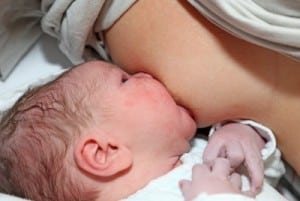
Consumer advocacy groups, like Public Citizen, argue that supplying formula samples to parents entangles the hospitals and all physicians involved in the marketing tactics of pharmaceutical and food manufacturers. This could be perceived as endorsement by parents and it may give parents the wrong message about the importance of breastfeeding.
“[Hospitals aim] to promote the health of infants and mothers, but the ongoing promotion of infant formula conflicts with this mission,” said Public Citizen President Robert Weissman in his letters to hospital chief executives.
Although breastfeeding benefits can be found easily online, in doctor’s offices and in WIC offices, breastfeeding rates continue to lag, particularly among lower income families. Only 14 percent of 6-month-old infants in the U.S. are exclusively breastfed, despite the fact that many health organizations, including the World Health Organization and American Academy of Pediatrics recommends that infants be breastfed exclusively for the first six months of life. This recommendation is being made because of the many health benefits received through breastfeeding for both mother and baby.
Boosting the breastfeeding rate in the U.S. is what the health organizations and consumer advocate groups aim to do with their initiative. They even have a goal – raising the rates from 14 percent of six-month-olds being exclusively breastfed to 26 percent by the year 2020. They say that the samples are standing in the way of helping them accomplish that goal by giving nursing mothers who are struggling with breastfeeding an easy out instead of offering breastfeeding help and support.
Some states and hospitals are already ahead of the game; they have banned formula samples either within the hospital itself or within the city or state. But according to last year’s report from the Centers for Disease Control and Prevention, a total of 66 percent of all hospitals in the U.S. are still offering formula samples to new parents. This is down from the previous 73 percent of hospitals offering the samples back in 2007, but advocacy groups say it’s still not good enough.
Trade groups aren’t going to go down without a fight, however. They say that samples have been offered for more than 40 years and that parents who take the bags home usually want them. Their goal is to offer parents options when it comes to child nutrition.
“We can’t forget that some moms, even though the plan to breastfeed, they either can’t or they decide not to,” said International Formula Council Executive Vice President Mardi Mountford. “We believe that they want more information, not less.”
The American Hospital Association also stood in defense regarding the continued offering of formula samples to new parents. They say that the policies for offering samples were drafted after hearing what mothers wanted. AHA agrees that breastfeeding is best, but they also say that “having information and resources available for mothers who choose not to breastfeed is a responsible and supportive approach for the hospital.”
In a sense, the International Formula Council Executive Vice President may be right – women do need more information when it comes to choosing the right type of infant nutrition, but is offering formula samples really the right way to educate new parents? Don’t get me wrong; I believe that it is important to know about formula safety and nutrition when choosing formula for your baby but in most cases, formula feeding isn’t quite as complex or as difficult to carry out as breastfeeding is. So, while every mother has the right to choose their infant’s source of nutrition, wouldn’t the funds for nutritional education best be spent on offering more support to nursing mothers?
Related Articles:
- Study: Preschoolers Not Getting Enough Outdoor Playtime
- Study: Caffeine Does Not Affect Breastfed Babies Sleep Patterns
- Researchers Investigate Changes in Labor Over Last 50 Years






